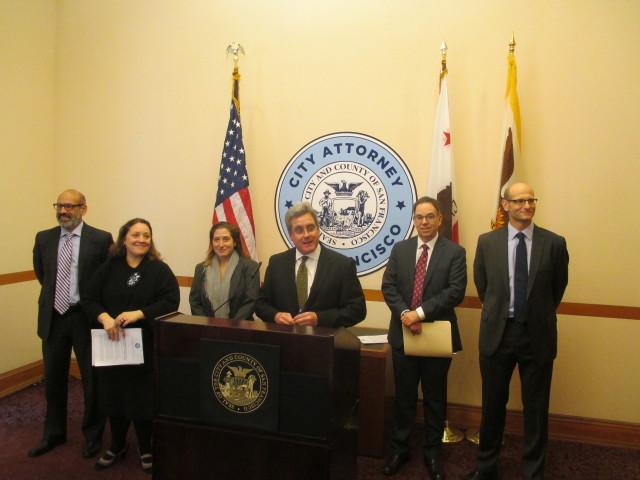Karnow says the ACCJC broke the law — and paves the way for the Legislature to reform or abolish it

By Tim Redmond
JANUARY 16, 2014 – The decision by Judge Curtis Karnow in the City College case is a clear victory for the school – and might be the beginning of the end for the accrediting agency that tried to shut it down.
It also provides a good argument for the end of the special trustee and a restoration of power to the elected college board.
“This is a wonderful, outstanding day for San Francisco,” City Attorney Dennis Herrera said at a press conference this afternoon.
The city didn’t get everything; the judge didn’t completely vacate the decision by the Accrediting Council for Community and Junior Colleges. Karnow didn’t agree that the decision to yank accreditation was driven by the ACCJC’s political agenda.
But he made two critically important rulings that will change the future of City College and possibly of accreditation in the future.
First, by entering the ruling in this case, Karnow confirmed that the State of California does, indeed, have jurisdiction over the ACCJC. The agency in the past has insisted that it’s above California law, that it is an independent entity whose practices and operations are subject only to approval by the federal Department of Education.
When the state Legislature sought to audit the ACCJC, agency officials refused to participate.

Karnow’s decision makes clear that’s not the case. “The ruling clearly states that the people of the state of California have oversight over this agency,” Assemblymember Phil Ting said in a conference call with reporters this afternoon.
That means, of course, that the state Legislature – where the ACCJC is radically unpopular – could move to either reform the rules for accreditation – or, as Ting suggested, simply replace the ACCJC as the sole accreditor for community colleges in California.
“We have to ask, is this the right body to oversee accreditation in the state?” Ting said.
I would be shocked in the Legislature didn’t start another audit, hold hearings on the ACCJC, and come up with some sort of effective legislation forcing the agency to clean up its act.
Second, Karnow ruled unequivocally that the ACCJC broke the law in its handling of the City College decision. “The people have proven that the ACCJC violated the unlawful prong of the [Unfair Competition Law],” Karnow wrote.
That means that the decision revoking City College’s standing in 2103 was illegal. And while the decision doesn’t say that the entire process has to be started over, some of it clearly does.
“Word has gone out to the accrediting agencies all over,” Herrera said. “They have to abide by the law.”
This is, Herrera noted, the first time to his knowledge that a judge has ever rendered this type of decision.
So now City College has a choice: Continue forward with a bogus and unfair “restoration” process – or tell the ACCJC that it wants the process that led to the 2013 decision started over again.
And that seems to be the direction the school is going. Chancellor Art Tyler released this statement:
“When today’s ruling is finalized by the judge, we will take the opportunity to ask the Commission to reconsider its termination decision and will present evidence, as we have for the last two years, of our continued progress and commitment to meeting the accreditation standards.”
Herrera’s office, as the winning party here, now gets to draft an order for the judge to sign that will put his ruling into effect. Herrera wouldn’t comment on what that order might include, but he said that it will “assure that City College is protected.”
The larger implication of all of this is fascinating.
The state chancellor, who put the special trustee in charge of City College and disempowered the elected board, did so – in his own admission – only because of the ACCJC’s accreditation decision.
If that decision was, as Kramer’s ruling confirms, illegal, then we could certainly argue that the imposition of the special trustee was improper. Which would mean that the state should immediately restore governing authority to the elected board.
Herrera didn’t want to address that, since it’s not part of the case, but Tim Killikelly, the head of the City College teachers’ union, did.
“This should be a springboard for action for the state to rein in this rogue agency and restore the elected trustees to power,” Killikelly said.
That action is in the hands of the state chancellor – but he will be under pressure from the city, the Legislature, and labor to recognize that the problem he sought to solve was created by an unlawful, unfair process.
Oddly, the ACCJC has given no signs of wanting to appeal the ruling. In a somewhat bizarre statement on its website, the agency insisted:
“Judge Karnow essentially found that the ACCJC did not do anything wrong with respect to its decisions regarding the accreditation of CCSF.” The statement concludes: “Now that the trial is over, now the focus can hopefully (sic) return to the restoration of CCSF’s accreditation status.”
How you can go from a judge saying you broke the law to a spin statement saying you did nothing wrong boggles the mind – and reflects that attitude of denial that has taken the ACCJC to this position in the first place.
BTW: I know it’s hard to write a story on a tight deadline when you’re dealing with a 70-plus-page complicated legal ruling, but to read the Chron, you’d think Herrera’s office lost. And Bob Egelko usually does a good job with legal stories.
The ruling wasn’t a complete slam-dunk win, but it was pretty good: “We didn’t get 100 percent, but I’ll certainly take 80 percent,” Herrera told me.
The bottom line is that the ACCJC is now in serious trouble and everyone knows it can’t be trusted to do fair evaluations with its current leadership and process. Smells like victory to me.




